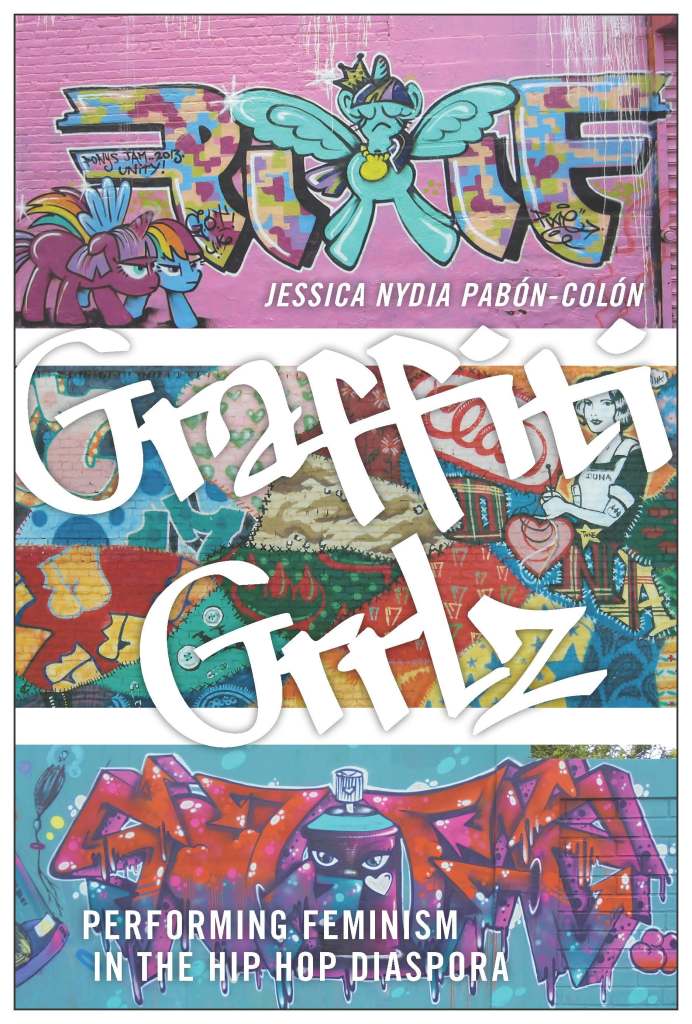The first academic study on women’s participation within Hip Hop graffiti art subculture, Graffiti Grrlz: Performing Feminism in the Hip Hop Diaspora is an interdisciplinary transnational feminist ethnography that examines how “graffiti grrlz” negotiate their place within a heterosexist male-dominated subculture.

Hip Hop graffiti art is characterized by the repetitive production of a tag name in order to communicate presence. Grounded in AfroCaribbean diasporic aesthetics such as call and response, self-naming, and polyrhythmic composition, graffiti proclaims: “I am here!” Since Hip Hop graffiti art emerged in the late 1960s, scholars, practitioners, and spectators have engaged the subculture as a “boys club” with a lens focused on cismale masculine performances of identity, community, and rebellion—effectively rendering graffiti “grrlz” nonexistent.
Graffiti Grrlz: Performing Feminism in the Hip Hop Diaspora is the first study on women’s participation within graffiti subculture. A transnational ethnography grounded in the stories of 100+ women in 23 countries (Australia, Brazil, Canada, Chile, Colombia, Costa Rica, Czech Republic, Ecuador, Egypt, France, Germany, Italy, Japan, Mexico, Netherlands, New Zealand, Nicaragua, Scotland, South Africa, Spain, United Arab Emirates, United Kingdom, and United States), Graffiti Grrlz examines the strategies grrlz utilize to elevate their status within a cisheterosexist male-dominated subculture. Deeming their strategies “performances of feminism,” I demonstrate how they remodel Hip Hop masculinity into “feminist masculinity”; cultivate an affective digital network across linguistic and geopolitical borders; strategically deploy alternative femininities to transform subcultural precarity; build transnational “feminist” community without feminist identity; and resist erasure by constituting herstories via digital archiving. Graffiti Grrlz provokes readers to reimagine graffiti subculture alongside transnational feminist movement, postulating a new way of seeing feminism and feminist movement—one that privileges the subcultural over the mainstream, the transnational over the Eurocentric, and the deviant over the respectable.
Order here!
Download the book cover in high resolution.
Reviews
In Graffiti Grrlz: Performing Feminism in the Hip Hop Diaspora, Jessica Nydia Pabón-Colón argues that women and girls who write graffiti activate a visual call-and-response in hip hop culture as a refusal to be silenced by heterosexism and heteropatriarchy across the globe.
—Jenell Rae Navarro, TDR: The Drama Review, Spring 2020 (read full review here)
Pabón-Colón’s in-person and digital ethnographic work over a long period of time enables her to give these women a space to be heard, not just in her research but also in events and forums she conducts and supports. Her sincerity and love of her work with these women is obvious and engaging. She lets the women speak to us, proudly and often, and we see a diverse and deep expression of women writers who each define women’s power on their own terms.
—Alexis L. Pavenick, Feminist Collections: a Quarterly of Women’s Studies Resources
In her groundbreaking book, women’s, gender, and sexuality studies professor, Dr. Jessica Nydia Pabón-Colón, explores how the graffiti subculture has been coded as male…Her dedication to detail and thoroughly researching is evident throughout the book. She explores over 100 women artists in 23 countries and makes a compelling case that graffiti subculture is a place where feminists come into their own.
—Bitch Media
Throughout Graffiti Grrlz, the author convincingly advances both feminism and graffiti as positive and vital social and political forces. Pabón-Colón’s work is a rich tribute to the grrls whose voices are too often silenced and a gift to all of us who love graffiti, perhaps the most significant art movement of our time.
—StreetArt NYC
There hasn’t been any significant interrogation into the gender politics of the art form or culture [of graffiti] until now. Jessica Nydia Pabón-Colón has presented her work in Graffiti Grrlz in a way that is thoughtful and thorough as she asks important questions about how women navigate the world of graffiti. Anyone with an interest in the art form and the culture should do themselves a favor and read this book.
—Scratched Vinyl
Please support Graffiti Grrlz by adding reviews on Amazon, Goodreads, Google Books, and/or Barnes & Noble.
If you’re interested in hosting a book signing or event, please contact me!